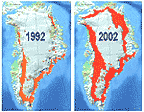
The melting of Greenland's ice sheet has accelerated so dramatically in the last three years, that for the first time it is triggering earthquakes that register up to three on the Richter scale.
The UN International
Panel on Climate Change (IPCC)’s report issued in February, is
already being revised. Their 2030 forecasts already
materialized this summer. Predictions made by the Arctic Council
over the last five years have been hopelessly overrun by the
extent of the thaw. In a year's time it will have reached 2050
estimates. Consequences of this massive acceleration of the
unprecedented thaw are outstripping the capacity of scientific
models to predict it.
The IPCC had published a conservative range of between 20cm-60cm
rise in sea levels for this century. But those estimates are now
heavily disputed, with many scientists insisting that new data
collected since the IPCC report six months ago suggested a rise
closer to two metres. Greenland's packed ice is up to three
kilometres thick and its total collapse into the ocean would
raise worldwide sea levels by seven metres.
With its 3 km thick ice barrier, Greenland has been for the last
10 000 years a powerful generator of deep cooling marine
currents flowing across the equator to South Africa and back up
North into the Indian ocean, returning warm “Gulf Stream”
surface waters to Europe. The rapid collapse of Greenland’s ice
cap could precipitate a new ice age where temperate climates
would disappear from insufficient heat exchange between the
poles and the tropics.